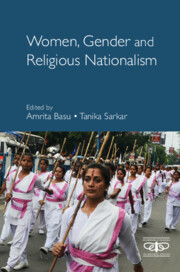Book contents
- Frontmatter
- Dedication
- Contents
- List of Abbreviations
- Introduction: Women of Hindu Rashtra
- Part I Changing Modalities of Hindu Nationalist Organizing
- Part II Gendered Techniques of Mobilization: The Sangh and the Samiti
- Part III Cultivating Women’s Militancy: The Vishva Hindu Parishad
- Part IV Refashioning Gender and Sexuality
- Part V Alternative Activist Responses to the Hindu Right
- Glossary
- About the Contributors
- Index
3 - The Shakha, the Home and the World: Going beyond the Shakha and the RSS Family
Published online by Cambridge University Press: 12 August 2022
- Frontmatter
- Dedication
- Contents
- List of Abbreviations
- Introduction: Women of Hindu Rashtra
- Part I Changing Modalities of Hindu Nationalist Organizing
- Part II Gendered Techniques of Mobilization: The Sangh and the Samiti
- Part III Cultivating Women’s Militancy: The Vishva Hindu Parishad
- Part IV Refashioning Gender and Sexuality
- Part V Alternative Activist Responses to the Hindu Right
- Glossary
- About the Contributors
- Index
Summary
In this chapter, I draw upon a repository of moving images, recollections, photo fragments, notes, memories and stories from three sets of journeys that I made to Nagpur, Maharashtra, while filming the Rashtriya Swayamsevak Sangh (henceforth RSS or Sangh) in 1992 when the Bhartiya Janta Party (henceforth BJP) was in the opposition; in 2000 and 2001 when the RSS–BJP came to power under the National Democratic Alliance (NDA) coalition government of Atal Bihari Vajpayee; and finally a third filming trip in 2016 when the RSS–BJP had become the force behind the state under the Narendra Modi regime. These trips have resulted in two films on the RSS – The Boy in the Branch (1993) and The Men in the Tree (2002) – and in contemporary research and ongoing visual documentation about different facets of the Sangh Parivar.
This chapter explores the role of the RSS shakha (branch) in reproducing and consolidating Hindu nationalist ideology. I argue for an extensive approach to the shakha that pays attention to both the daily structured activities that take place within the branch and the social connections that are forged by networks, spaces and milieus outside the shakha environment. I suggest that the key to the shakha's effectiveness lie in these linkages that are able to extend the ideology and the form of the shakha from the playground, the home and the family to the world at large.
The argument is developed in three sections. In the first section of the chapter ‘The Shakha Within’, I explore how the RSS shakha structures and reproduces social relations within Maharashtrian, Brahmin-dominated neighbourhoods in Nagpur. I show how the shakha indoctrinates Hindu boys and young men to the worldview of the RSS through an ingenious system involving play and storytelling, somatic ritual, discipline and bodily comportment and leisure-time socialization that extends beyond the ambit of the daily shakha meetings. I show how the shakha games and stories are adapted according to the age of the volunteer, and how these gradually become more ideological and physical over time with the eventual aim of creating loyal, action-oriented and militant bodies in the service of the RSS.
- Type
- Chapter
- Information
- Women, Gender and Religious Nationalism , pp. 77 - 124Publisher: Cambridge University PressPrint publication year: 2022

